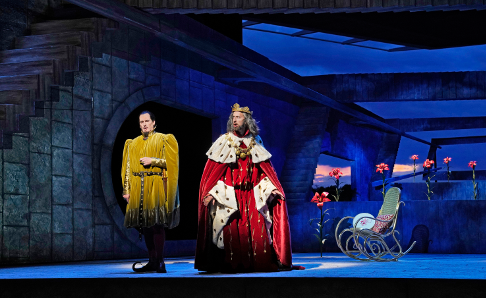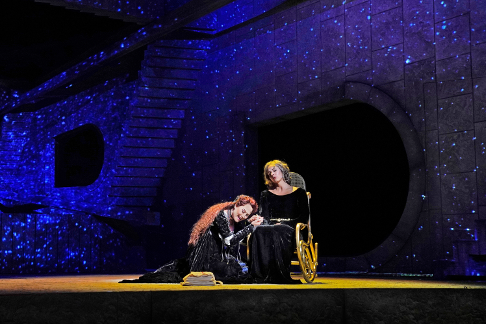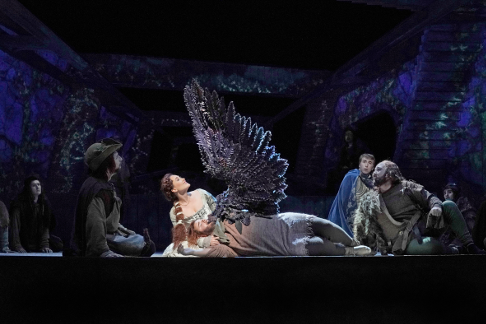![Tamara Mumford (Queen Gertrude) [Photo by Ken Howard for the Santa Fe Opera]](http://www.operatoday.com/13Child_001.png)
05 Aug 2019
The Thirteenth Child: When She Was Good…
Santa Fe Opera continues its remarkable record for producing World (and American) Premieres with The Thirteenth Child, music by Poul Ruders, libretto by Becky and David Starobin.
English Touring Opera are delighted to announce a season of lyric monodramas to tour nationally from October to December. The season features music for solo singer and piano by Argento, Britten, Tippett and Shostakovich with a bold and inventive approach to making opera during social distancing.
This tenth of ten Live from London concerts was in fact a recorded live performance from California. It was no less enjoyable for that, and it was also uplifting to learn that this wasn’t in fact the ‘last’ LfL event that we will be able to enjoy, courtesy of VOCES8 and their fellow vocal ensembles (more below …).
Ever since Wigmore Hall announced their superb series of autumn concerts, all streamed live and available free of charge, I’d been looking forward to this song recital by Ian Bostridge and Imogen Cooper.
Although Stile Antico’s programme article for their Live from London recital introduced their selection from the many treasures of the English Renaissance in the context of the theological debates and upheavals of the Tudor and Elizabethan years, their performance was more evocative of private chamber music than of public liturgy.
Evidently, face masks don’t stifle appreciative “Bravo!”s. And, reducing audience numbers doesn’t lower the volume of such acclamations. For, the audience at Wigmore Hall gave soprano Elizabeth Llewellyn and pianist Simon Lepper a greatly deserved warm reception and hearty response following this lunchtime recital of late-Romantic song.
For this week’s Live from London vocal recital we moved from the home of VOCES8, St Anne and St Agnes in the City of London, to Kings Place, where The Sixteen - who have been associate artists at the venue for some time - presented a programme of music and words bound together by the theme of ‘reflection’.
'Such is your divine Disposation that both you excellently understand, and royally entertaine the Exercise of Musicke.’
‘And there was war in heaven: Michael and his angels fought against the dragon; and the dragon fought and his angels, And prevailed not; neither was their place found any more in heaven … that old serpent … Satan, which deceiveth the whole world: he was cast out into the earth, and his angels were cast out with him.’
There was never any doubt that the fifth of the twelve Met Stars Live in Concert broadcasts was going to be a palpably intense and vivid event, as well as a musically stunning and theatrically enervating experience.
‘Love’ was the theme for this Live from London performance by Apollo5. Given the complexity and diversity of that human emotion, and Apollo5’s reputation for versatility and diverse repertoire, ranging from Renaissance choral music to jazz, from contemporary classical works to popular song, it was no surprise that their programme spanned 500 years and several musical styles.
The Academy of St Martin in the Fields have titled their autumn series of eight concerts - which are taking place at 5pm and 7.30pm on two Saturdays each month at their home venue in Trafalgar Square, and being filmed for streaming the following Thursday - ‘re:connect’.
The London Symphony Orchestra opened their Autumn 2020 season with a homage to Oliver Knussen, who died at the age of 66 in July 2018. The programme traced a national musical lineage through the twentieth century, from Britten to Knussen, on to Mark-Anthony Turnage, and entwining the LSO and Rattle too.
With the Live from London digital vocal festival entering the second half of the series, the festival’s host, VOCES8, returned to their home at St Annes and St Agnes in the City of London to present a sequence of ‘Choral Dances’ - vocal music inspired by dance, embracing diverse genres from the Renaissance madrigal to swing jazz.
Just a few unison string wriggles from the opening of Mozart’s overture to Le nozze di Figaro are enough to make any opera-lover perch on the edge of their seat, in excited anticipation of the drama in music to come, so there could be no other curtain-raiser for this Gala Concert at the Royal Opera House, the latest instalment from ‘their House’ to ‘our houses’.
"Before the ending of the day, creator of all things, we pray that, with your accustomed mercy, you may watch over us."
The doors at The Metropolitan Opera will not open to live audiences until 2021 at the earliest, and the likelihood of normal operatic life resuming in cities around the world looks but a distant dream at present. But, while we may not be invited from our homes into the opera house for some time yet, with its free daily screenings of past productions and its pay-per-view Met Stars Live in Concert series, the Met continues to bring opera into our homes.
Music-making at this year’s Grange Festival Opera may have fallen silent in June and July, but the country house and extensive grounds of The Grange provided an ideal setting for a weekend of twelve specially conceived ‘promenade’ performances encompassing music and dance.
There’s a “slide of harmony” and “all the bones leave your body at that moment and you collapse to the floor, it’s so extraordinary.”
“Music for a while, shall all your cares beguile.”
The hum of bees rising from myriad scented blooms; gentle strains of birdsong; the cheerful chatter of picnickers beside a still lake; decorous thwacks of leather on willow; song and music floating through the warm evening air.
![Tamara Mumford (Queen Gertrude) [Photo by Ken Howard for the Santa Fe Opera]](http://www.operatoday.com/13Child_001.png)
Santa Fe Opera continues its remarkable record for producing World (and American) Premieres with The Thirteenth Child, music by Poul Ruders, libretto by Becky and David Starobin.
A co-production with Odense Symphony Orchestra, this new work is alternately entertaining and stirring, with a dose of “frustrating” thrown in. Given its many strengths, this impressed me as a wonderfully promising work in progress, rather than the gripping thriller its promotion seems to wish it already were.
The opera is inspired by a little-known short story by the Brothers Grimm, “The Twelve Brothers .” The ominous plot encompasses a wide-ranging exploration of good versus evil, highlighting power plays and malevolent political machinations. As is often the case, love wins out, but not before some gripping confrontations and melodious musings. More on the story below.
Ruders has described his music for The Thirteenth Child as “ear candy with chili peppers.” In this case, the candy was a tasty enough treat, but the heat factor of the peppers is in the mild to medium range. Given the percussive, aggressively knotty aural universe of Ruders’ acclaimed dystopian opera, The Handmaid’s Tale, I was expecting something a little more prickly here, given the Gothic possibilities of the Grimm source material.
 Bradley Garvin (Drokan) and David Leigh (King Hjarne)
Bradley Garvin (Drokan) and David Leigh (King Hjarne)
To be sure, there are somewhat atonal brass snaps and snarls as compelling commentary on the emotional subtext of the main characters. And the percussion section got quite a workout, manning an encyclopedic artillery of bombastic effects. But I was most struck by the prevailing melodious, tonal accessibility of much of Ruders’ writing, and the often shimmering string effects, complemented by haunting wind meanderings.
The vocal writing is characterized by uses of extreme tessiture at both ends of the range. Unlike composer Thomas Adès, who revels in sadistically making singers make ugly and/or incomprehensible sounds beyond the limits of their range, Ruders challenges his vocalists but does not plot to defeat them. His use of several falsetto effects for the two bass-baritones was more well-intended than well-realized. The recurring themes, the accommodating orchestrations, the sinuous melody lines, and the exploration of the exhaustively comprehensive uses of the human voice all combine to make for a fascinating listening experience. And what accomplished singers they are.
As Hjarne, King of Frohagord, bass David Leigh unleashed a torrent of dark, pointed snarls that conveyed powerful determination as well as pitiable self-doubt. His dramatic commitment and authoritative deportment commanded the stage. Tamara Mumford expertly co-anchored the first act as Gertrude, Queen of Frohagord. Ms. Mumford’s dusky, hauntingly rich mezzo-soprano and handsome regal bearing made her a perfect complement to her ill-intended consort. Although both singers successfully delivered affecting serpentine phrases in low-lying stretches, they also were capable of thrilling, sizzling outbursts above the staff. For reasons that eluded me, David Leigh, whose King character dies in Act I, returns to perform the miniscule role of Corbin, Eldest Prince in Act II.
This composer especially likes his singing low and dark, and bass-baritone Bradley Garvin revels in his murderous power grab musings as Drokan, Regent of the Kingdom of Hauven. Mr. Garvin is also called upon to limn rangy phrases with simmering wickedness, and his secure instrument rings out potently in the house throughout the range and at all volumes.
 Jessica Jones (Lyra) and Tamara Mumford (Queen Gertrude)
Jessica Jones (Lyra) and Tamara Mumford (Queen Gertrude)
We have to wait until midway in Act I for the appearance of “the thirteenth child,” aka Lyra, Princess of Frohagord, but the delectable soprano Jessica E. Jones makes it decidedly worth the wait. Ms. Jones’ glistening lyric soprano is possessed of a silvery sheen and a sound technique that results in a limpid, touching vocal presentation.
Frederic, Prince of Hauven is her love interest and tenor Joshua Dennis sings the underdeveloped role with secure, honeyed tone that seems to sweeten the higher it climbs. Mr. Dennis’ voice blends enchantingly with Ms. Jones, making their dulcet duets among the evening’s lyrical highlights.
Apprentice Artist Bille Bruley finds a good match for his exuberant, substantial tenor in the relatively short, though important role of Benjamin, Youngest Prince of Frohagord. Mr. Bruley’s poised singing and likable demeanor, combined with his dramatic commitment made him an audience favorite in what is arguably the opera’s most appealing character. Fellow Apprentice Anthony Ciaramitaro showed off a strong tenor in his brief solo utterances given to the role of Toke, Second Oldest Prince. Chorus Master Susanne Sheston’s ensemble of Apprentice Artists was tutored to a fare thee well.
 Jessica Jones (Lyra) and Bille Bruley (Benjamin)
Jessica Jones (Lyra) and Bille Bruley (Benjamin)
Although librettists David and Becky Starobin have condensed the fairy tale into manageable chunks, some holes exist in the script that seem to beg that we have filled in those blanks by having read the synopsis very thoroughly. The story in brief:
King Hjarne of Frohagord has 12 sons and has been led to believe that all of them wish him ill. His wife Gertrude is pregnant, and he tells her that if she bears a girl he will kill all the boys and let the daughter alone inherit his throne. To save them, Gertrude sends the boys out into the forest that night and gives them the magical red lilies that protect Frohagord to ensure their safety.
Flash forward 18 years: The King has died, the Queen is critically ill, and their daughter the Princess Lyra has grown to be a young lady. Frederic, a prince from a neighboring kingdom, is interested in her hand but the evil regent, Drokan, wants her for himself. Lyra tends to her dying mother who gives her 12 shirts she made for the boys and as her dying wish, sends the daughter off to look for them.
The Princess does indeed find her grown up brothers and to decorate the celebratory dinner table feast, she assembles a bouquet by cutting 12 flowers, not realizing they are the magic lilies that protected the boys. Her act unintentionally transforms her brothers into ravens (no kidding). Her mother’s spirit mysteriously appears to tell Lyra that she can redeem herself by staying mute for seven years.
Flash forward another 6 years: Frederic (remember Frederic?) finds the silent Lyra and still wants to marry her. But Drokan (remember Drokan?) still wants her too and tries to burn her on a bonfire. After Evil gets vanquished by Good in a brief struggle, all ends (mostly) happily. There is no question that there are great possibilities inherent in this fantastical tale, and many of them were successfully exploited. But there are a couple of dramatic and musical holes and transitions that I would urge the prodigiously talented creators to consider.
In an apparent effort to keep the piece lean and mean, the immediate acceptance of Princess Lyra by her brothers was a “huh?” moment. The men supposedly have a festering resentment of the sister they never met, since her birth caused their banishment, to the point that they commit to killing her should they ever meet her.
She encounters Benjamin first, and once he knows who she is, they immediately bond as besties. When the other brothers approach, Ben says he has to hide her or they will make good on their vow to kill her. About a page and a half later, he decides to reveal her, and the other brothers immediately accept her with no further mention of their avowed revenge.
Another leap of faith is the transformation of the boys into ravens. Only Benjamin appears on the fringes of the set with a big black wing attached to his left arm (only) that tries to show “I’m a bird now. . .get it? “The rest of the aviary is communicated in a swarming projection, one of many excellent effects by projection designer Aaron Rhyne that greatly enhanced the narrative.
The finale is the portion that needs the most redevelopment. A great tragedy befalls at the end, shaking Lyra to her core. In what should be a transition of eventual acceptance that life still must go on, and happiness can still be found, we get instead a rather abrupt dramatic shrug, a few bars of “stuff happens” sentiments, and a really unexpected flourish of a wrap up that was startlingly blunt in its brevity.
The Escher-like set certainly is a thing of atmospheric beauty. It is as though we are lying on the stone floor of an ancient castle looking up the tower in a forced perspective that ends upstage with a filigreed roof that allows us the view of the spectacular sunset beyond. Two long staircases, perhaps to nowhere, flank the structure stage left and right.
Complementing Mr. Rhyne’s masterful projections, York Kennedy has contributed a largely effective, brooding lighting design. Rita Ryack’s diverse costume design runs the fantasy gamut from humble peasants to picture book perfect royal lovebirds, to villainously regal powerbrokers. Ms. Ryack has greatly assisted in conveying the essence of each character, most especially with her lavish, layered attire for Queen Gertrude.
Darko Tresnjak directed the proceedings with a competent hand, although the stage pictures were often predictable, and characters did not always interact with each other as meaningfully as they might have. At a number of key junctures, soloists were singing to the back wall of the balcony rather than the person on stage they were addressing.
Too, there were a few underwhelming moments that could have been more imaginatively realized. The lighting of a (supposed) menacing pyre, the climactic (clumsily performed) swordfight that results in two deaths, the aforementioned (meant to be) ominous bird transformation, all seemed to go for less than they should have. Label them “opportunities missed.”
Saving the very best for last, the top notch SFO orchestra was in sublime form all evening long. Paul Daniel was in firm command of his forces and they responded with playing that was by turns luminous, wrenching, ethereal, chilling, and always dripping with theatrical fervor. Maestro Daniel made as impressive a case as possible for Mr. Ruders’ unique sound palette.
It is tricky to give a new work legs and highly laudable that Santa Fe Opera continues to champion these world premieres. There was so much to enjoy in this first run of The Thirteenth Child, that I hope its creators continue to develop it into the fully-realized, engrossing work it might become.
James Sohre
The Thirteenth Child
Music by Poul Ruders
Libretto by Becky and David Starobin
Hjarne, King of Frohagord: David Leigh; Drokan, Regent of the Kingdom of Hauven: Bradley Garvin; Gertrude, Queen of Frohagord: Tamara Mumford; Frederic, Prince of Hauven: Joshua Dennis; Lyra, Princess of Frohagord: Jessica E. Jones; Benjamin, Youngest Prince of Frohagord: Bille Bruley; Corbin, Eldest Prince: David Leigh; Toke, Second Oldest Prince: Anthony Ciaramitaro; Conductor: Paul Daniel; Director: Darko Tresnjak; Set Design: Alexander Dodge; Costume Design: Rita Ryack; Lighting Design: York Kennedy: Projection Design: Aaron Rhyne; Chorus Master: Susanne Sheston.